
RUSSIAN METALLURGY
Scope & Guideline
Pioneering Research in Metallurgy Since 1984
Introduction
Aims and Scopes
- Metallurgical Processes:
Research on the processes involved in the extraction, refining, and fabrication of metals, including innovations in metallurgy and thermodynamics. - Material Properties and Behavior:
Study of the mechanical, thermal, and chemical properties of metals and alloys, including their behavior under various conditions such as stress, temperature, and environmental factors. - Advanced Materials and Coatings:
Development and analysis of new materials, including composites, nanomaterials, and coatings designed to enhance performance and durability in industrial applications. - Digital Technologies in Metallurgy:
Integration of digital tools and methodologies in metallurgical processes, including modeling, simulation, and data-driven approaches for optimization. - Environmental and Resource Efficiency:
Research focused on sustainable practices in metallurgy, including recycling, waste management, and the reduction of energy consumption in metallurgical processes. - Characterization Techniques:
Advancements in techniques for characterizing materials at micro and nano levels, including structural, phase, and compositional analysis.
Trending and Emerging
- Additive Manufacturing and 3D Printing:
A significant increase in research related to additive manufacturing technologies, particularly in the context of metals and alloys, showcases the industry's move towards innovative production methods. - Nanomaterials and Coatings:
Growing interest in the development and application of nanotechnology in metallurgy, particularly for enhancing material properties and creating advanced coatings. - Sustainable Metallurgy Practices:
A trend towards research focused on sustainability in metallurgy, including recycling processes and the use of alternative materials to reduce environmental impact. - Digital Innovation in Metallurgy:
An emerging focus on digital technologies, including simulations and AI applications, indicates a shift towards data-driven approaches to optimize metallurgical processes. - High-Performance Alloys and Composites:
Increasing research on high-performance materials designed for specific applications, such as aerospace and automotive, highlighting advancements in material science.
Declining or Waning
- Traditional Metallurgical Techniques:
Research focused on conventional metallurgical methods may be waning as the field shifts towards more innovative and advanced techniques. - Basic Alloy Development:
The focus on developing new alloys with traditional compositions is decreasing, possibly in favor of more complex materials and composites. - Historical Metallurgy Studies:
Papers concentrating on historical analyses of metallurgy practices have become less frequent, indicating a shift towards contemporary and future-focused research. - Standard Testing Methods:
Research related to standard testing methods for metallurgical materials seems to be diminishing, as the field moves towards more specialized and application-oriented investigations.
Similar Journals

METALLURGIST
Bridging Theory and Practice in the World of Metallurgy.METALLURGIST, published by SPRINGER, is a distinguished journal dedicated to advancing the field of metallurgy and materials science. With a rich history dating back to 1957, this journal serves as an essential platform for disseminating cutting-edge research encompassing a wide scope of topics, including condensed matter physics, materials chemistry, and the mechanics of materials. The journal's impact can be seen through its categorization in the Q4 and Q3 quartiles across various fields, indicating its significance in the global research landscape. Although it is not an open-access publication, METALLURGIST maintains high academic standards and attracts contributions that provide valuable insights into metals and alloys, offering researchers and professionals a wealth of knowledge that is pivotal for innovative developments in the materials sector. With its continued commitment to excellence, METALLURGIST aims to foster collaboration and engagement within the metallurgical community, making it a vital resource for students, researchers, and industry experts alike.

INORGANIC MATERIALS
Shaping the Future of Inorganic Materials ScienceINORGANIC MATERIALS, published by MAIK NAUKA/INTERPERIODICA/SPRINGER, is a pivotal journal in the realm of Materials Science, focusing primarily on the exploration and application of inorganic materials. With a robust commitment to advancing knowledge in areas such as Metals and Alloys, Inorganic Chemistry, and Chemical Engineering, this journal has successfully maintained a reputation for quality, achieving various category quartiles in 2023, including Q3 in Chemical Engineering and Materials Chemistry, and Q4 in Inorganic Chemistry. Although it operates under traditional access models, the journal welcomes contributions from researchers dedicated to understanding the properties and applications of inorganic substances. Throughout its publication history from 1996 to 2024, INORGANIC MATERIALS has become an essential resource for those engaged in innovative research and development, making it an invaluable tool for students, professionals, and academics alike.
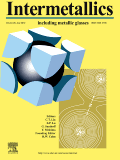
INTERMETALLICS
Exploring the Depths of Intermetallic InnovationINTERMETALLICS, a prestigious journal published by ELSEVIER SCI LTD in the United Kingdom, has been a vital resource in the fields of Materials Science, Mechanical Engineering, and Chemistry since its inception in 1993. Renowned for its rigorous peer-review process and commitment to high-quality research, this journal enjoys an impressive position within the top quartile (Q1) rankings of its categories, signifying its influence and esteem in the academic community. With a particular emphasis on the study of intermetallic compounds and their applications, INTERMETALLICS attracts groundbreaking research and innovative contributions that push the boundaries of knowledge in metals and alloys, as well as mechanics of materials. Researchers looking for a platform to disseminate cutting-edge findings will find this journal an exemplary choice, further enhanced by its commendable Scopus rankings that illustrate its widespread recognition and relevance. Though it does not currently offer Open Access options, the journal remains committed to advancing the field through selective publication of impactful research, making it an essential reference for researchers, professionals, and students alike interested in the dynamic interplay between materials and engineering.

METALLURGICAL AND MATERIALS TRANSACTIONS B-PROCESS METALLURGY AND MATERIALS PROCESSING SCIENCE
Advancing the Frontiers of Metallurgy and Materials ProcessingMETALLURGICAL AND MATERIALS TRANSACTIONS B-PROCESS METALLURGY AND MATERIALS PROCESSING SCIENCE, published by Springer, serves as a pivotal platform in advancing the field of materials science, focusing specifically on the intricacies of process metallurgy and materials processing. With an ISSN of 1073-5615 and an E-ISSN of 1543-1916, this esteemed journal boasts an impressive standing with its 2023 category quartiles, ranking Q2 in Condensed Matter Physics, Materials Chemistry, and Mechanics of Materials, while achieving a top-tier Q1 classification in Metals and Alloys. Positioned in the United States, the journal has been publishing leading research since its inception, with converged years spanning from 1973 to 1979 and 1995 to 2024. The journal's robust impact within its fields is reflected in its Scopus rankings, notably ranking #42 out of 176 in Materials Science with a 76th percentile. Though not an open access journal, its comprehensive and high-quality research articles cater to the needs of researchers, professionals, and students, ensuring they remain at the forefront of advancements in metallurgy and materials processing science.
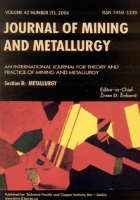
Journal of Mining and Metallurgy Section B-Metallurgy
Pioneering advancements in metallurgy and materials sciences.Journal of Mining and Metallurgy Section B-Metallurgy is a prominent open-access journal published by the Technical Faculty, Bor-Serbia. Established in 2002, the journal has become a vital platform for disseminating high-quality research in the fields of metallurgy, geotechnical engineering, and materials sciences. With an E-ISSN of 2217-7175, the journal has successfully converged its publication years from 2007 to 2024, indicating its commitment to ongoing academic discourse. The journal is currently ranked Q3 in multiple categories including Geotechnical Engineering and Engineering Geology, Materials Chemistry, Mechanics of Materials, and Metals and Alloys, reflecting its importance in academic research and professional practice. With a Scopus rank that positions it within the 30th percentile across various related disciplines, the Journal of Mining and Metallurgy Section B-Metallurgy serves as an invaluable resource for researchers, professionals, and students who seek to explore cutting-edge advancements in metallurgy and materials science. It provides vital insights that contribute to the development and innovation in these essential fields.
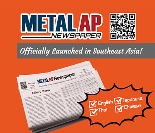
China Foundry
Connecting Global Scholars in Materials ChemistryChina Foundry is a prestigious journal published by SPRINGER SINGAPORE PTE LTD, specializing in the fields of materials chemistry and metals and alloys. With an impact factor that showcases its reputable standing, this journal is categorized within the Q2 quartile for both Materials Chemistry and Metals and Alloys as of 2023. As an Open Access journal since 2004, it ensures that cutting-edge research is readily available to a global audience, promoting knowledge dissemination among researchers, professionals, and students alike. With a rich history converging from 2008 to 2024, China Foundry serves as a critical resource for the latest advancements and innovations in foundry technology, materials processing, and related fields. The journal's commitment to excellence is also reflected in its Scopus ranks, positioning it favorably within the competitive landscape of materials science. By fostering academic discourse and collaboration, China Foundry is an essential platform for those looking to contribute to and engage with the fast-evolving world of materials science.
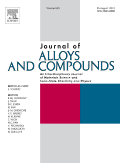
Journal of Alloys and Compounds
Pioneering Discoveries in Alloys and CompoundsJournal of Alloys and Compounds, published by Elsevier Science SA, stands at the forefront of materials research, focusing on the properties, applications, and innovations within alloys and compounds. With an impressive impact factor and prestigious rankings placing it in the Q1 quartile across multiple related categories—including Materials Chemistry, Mechanical Engineering, and Mechanics of Materials—this journal is recognized for its significant contributions to the field. Researchers and professionals engaged in metallurgy, materials science, and engineering will find it a critical resource that encompasses groundbreaking studies, insightful reviews, and essential findings. The journal has a strong influence, as evidenced by its Scopus rankings—ranking 14th in Metals and Alloys and 28th in Mechanics of Materials, indicating a robust global impact. As it continues to publish cutting-edge research from 1991 to 2024, the Journal of Alloys and Compounds serves as a vital platform for the exchange of knowledge, thereby advancing our understanding of complex materials and fostering innovation in diverse applications.

Metallurgical Research & Technology
Advancing metallurgical innovation for a sustainable future.Metallurgical Research & Technology is a distinguished journal published by EDP SCIENCES S A based in France, focusing on the dynamic field of metallurgical science and engineering. With a strong emphasis on the latest advancements in Materials Chemistry, Computational Mechanics, and Mechanics of Materials, this journal aims to provide a platform for researchers to share innovative findings that propel the field forward. As of 2023, it has secured a commendable position in various categories, including Q3 rankings in Computational Mechanics, Materials Chemistry, and Mechanics of Materials, along with a Q2 ranking in Metals and Alloys. The journal actively promotes open access, facilitating broader dissemination of critical research across the globe. Researchers, professionals, and students in the metallurgical domain will find Metallurgical Research & Technology an invaluable resource for cutting-edge developments and collaborative opportunities.
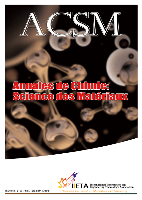
ANNALES DE CHIMIE-SCIENCE DES MATERIAUX
Unveiling the Science Behind Advanced MaterialsANNALES DE CHIMIE-SCIENCE DES MATERIAUX, published by the International Information & Engineering Technology Association, serves as a significant resource in the field of materials chemistry. With an ISSN of 0151-9107 and an E-ISSN of 1958-5934, this journal has been contributing to the scientific discourse since its inception in 1947. The journal is classified in the Q3 category for Materials Chemistry in 2023, positioning it within the 29th percentile in the Scopus ranking for materials science, underscoring its commitment to advancing knowledge and innovation in this vital area of research. Although currently not an open access publication, the journal welcomes submissions that explore a broad range of topics related to material science, thereby facilitating discussions that can lead to groundbreaking discoveries. Researchers, professionals, and students are encouraged to engage with the journal to stay at the forefront of materials chemistry, especially given its historical context and ongoing relevance in academic and industrial applications.
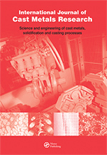
INTERNATIONAL JOURNAL OF CAST METALS RESEARCH
Elevating Standards in Metals and Alloys ResearchInternational Journal of Cast Metals Research, published by Taylor & Francis Ltd, serves as a premier platform for the dissemination of cutting-edge research in the fields of Mechanical Engineering, Mechanics of Materials, and Metals and Alloys. With a commitment to advancing the understanding of cast metals, this peer-reviewed journal has achieved notable recognition, featuring a 2023 Q2 ranking in its respective categories and ranking 71st in the Materials Science field according to Scopus. Researchers and professionals will find a wealth of valuable insights through rigorous studies and innovative findings, reflecting the journal's goal of facilitating knowledge transfer and addressing contemporary challenges in material science. Furthermore, its accessible publication years from 1996 to 2024 ensure that it not only captures the evolution of technology in cast metals but also stands at the forefront of future developments. Ideal for academics and practitioners alike, the journal aims to foster collaboration and inspire new developments within the discipline.